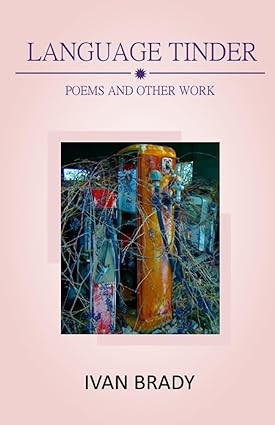
LANGUAGE TINDER: Poems and Other Work Paperback – August 2, 2023 by Ivan Brady (Author)
It promises readers an engaging and thought-provoking journey through a world of diverse cultures, vivid imagery, and profound insights into both human nature and the natural world.
Amazon USALANGUAGE TINDER: Poems and Other Work Paperback – August 2, 2023 by Ivan Brady (Author)
- Publisher : Cyberwit.net (August 2, 2023)
- Language : English
- Paperback : 123 pages
- ISBN-10 : 8119228693
- ISBN-13 : 978-8119228690
- Item Weight : 7.7 ounces
- Dimensions : 5.5 x 0.31 x 8.5 inches
- Best Sellers Rank: #398,745 in Books
We feel his emotions and passion for life and the written word as he witnesses many cultures with imagination both ‘dazzling’, thought provoking, richly imbued with intimacy, dream, reality and vast visual vistas of profound awareness of nature in all its vitality. Ivan Brady promises readers an engaging and thought-provoking journey through a world of diverse cultures, vivid imagery, and profound insights into both human nature and the natural world.
WAR IS THAT KIND OF WORD
History and recent events teach us
the war word is smaller than bloody
realities in its landscapes, always
deeper than its surface flags suggest.
Sometimes the listener picks only the
meaning she needs to find, or finds easy
to link quickly to others, letting one
more message flash by as her thought train
zips through the desert of dead metaphors. (p. 35)
"War Is That Kind of Word" is a brief yet impactful poem that invites readers to contemplate the complexities and limitations of the term "war." Here's a review of the poem:
The title serves as an excellent entry point into the poem's central theme. It immediately directs the reader's attention to the idea that the word "war" encompasses more than what initially meets the eye.
The poem's opening lines effectively convey the idea that the word "war" is insufficient in capturing the full magnitude and depth of the conflicts it represents. It suggests that the horrors and consequences of war go beyond the mere utterance of the word.
The poem also touches upon the notion that individuals tend to interpret and understand the word "war" selectively, based on their own perspectives and experiences. This introduces an element of subjectivity and highlights how people often focus on specific aspects of war, perhaps to distance themselves from its harsh realities.
The metaphor of the "desert of dead metaphors" is particularly striking. It conveys the idea that the word "war" has been overused and has lost some of its original impact. This can lead to a desensitization to the true human suffering and devastation caused by war.
In conclusion, "War Is That Kind of Word" is a succinct poem that encourages readers to consider the limitations of language when it comes to describing the profound and often devastating effects of war. It serves as a reminder that behind the word itself lie intricate and deeply affecting human experiences that cannot be fully encapsulated by language alone.
Also "What Is My Number?" is a deeply reflective and thought-provoking poem that delves into the complexities of quantifying human experiences and the challenges of living in a world marred by violence and injustice. Here's a review of the poem:
The title of the poem, "What Is My Number?" immediately draws attention to the dehumanizing aspect of reducing individuals to statistics or data points in a census. It sets the stage for a contemplative exploration of the limitations of such categorization.
The poem skillfully progresses from the notion of being recognized as a person to the deeper exploration of the human condition. The mention of hearing the speaker's heartbeat and glimpsing the interior of their soul conveys the idea that true understanding goes beyond mere numbers or statistics. It highlights the depth and complexity of each individual's unique experiences and emotions.
The central question posed in the poem, "How will you deal with living a life," serves as a powerful challenge to the reader. It forces us to confront the harsh realities of the world, including rape, murder, bigotry, and other acts of violence and injustice. These are experiences that cannot be reduced to mere numbers or easily quantified in a survey.
The poem underscores the inadequacy of statistics and surveys in capturing the full extent of human suffering and the complexities of life. It prompts readers to consider how they will respond to a world marked by such atrocities and whether they will take meaningful action to address these issues.
In conclusion, "What Is My Number?" is a moving and introspective poem that encourages readers to look beyond the surface and acknowledge the depth of human experiences. It challenges us to confront the harsh realities of the world and take meaningful steps towards positive change.
WHAT IS MY NUMBER?
Now that you have found my unfaced place
in the census count
and pulled me up as a person,
and thus have heard my heartbeat,
and had a glimpse of the interior of my soul,
How will you deal with living a life
that includes rape, murder, bigotry
bombs, beatings
and the stoning to death of children
among other things that cannot be re-presented
as numbers in a survey? (p. 41)
--Agarwal, Rochak. 2023. Review of Language Tinder by Ivan Brady. Pegasus Literary
